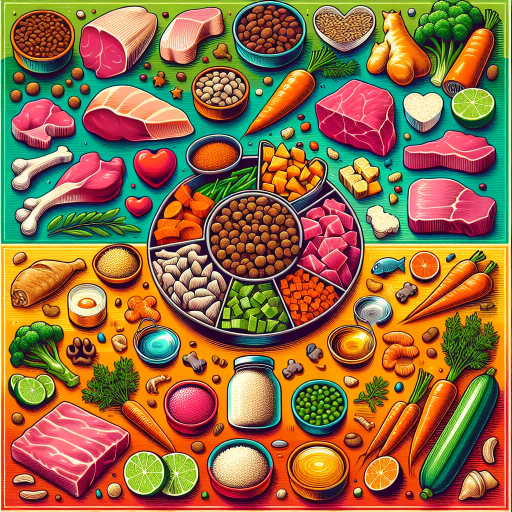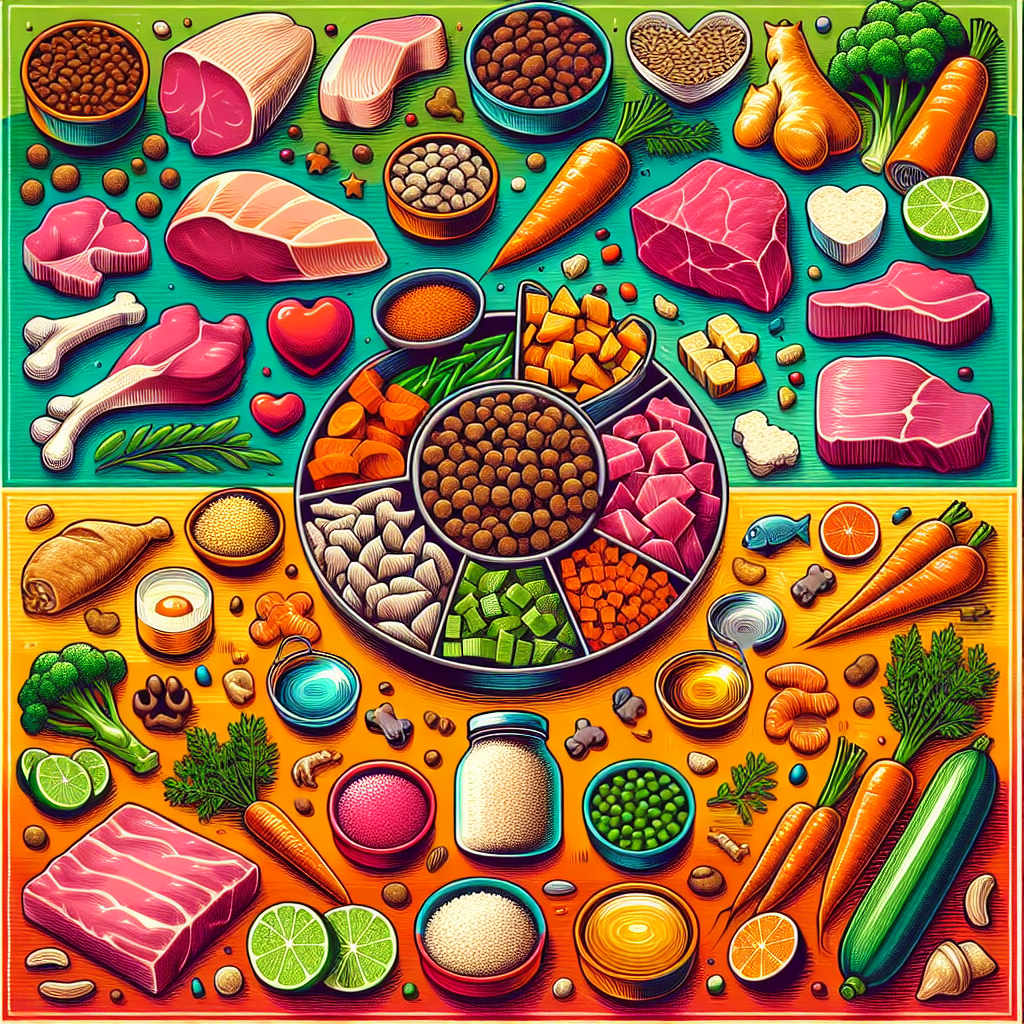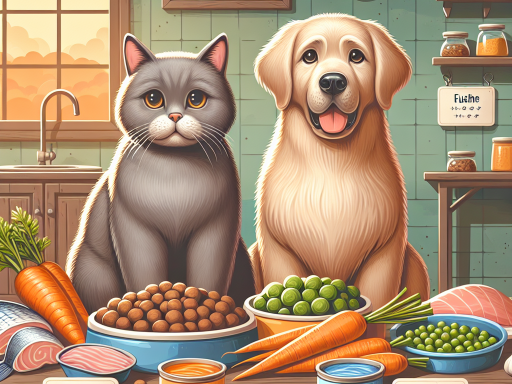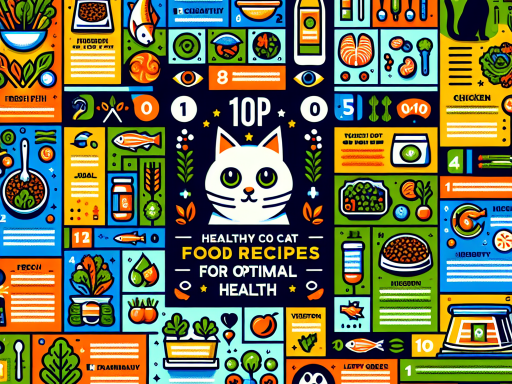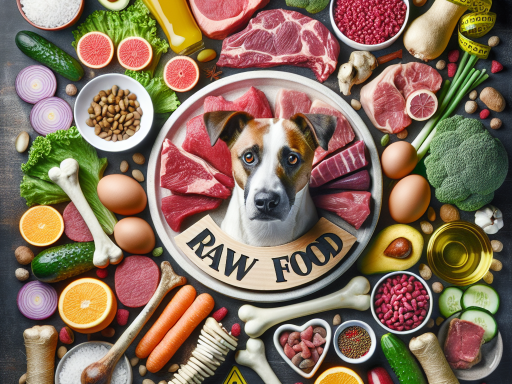Introduction to Homemade Dog Food
Welcome to the world of homemade dog food! If you’re anything like me, your furry friend is more than just a pet—they’re a cherished member of the family. And just like with any family member, you want the best for them, especially when it comes to their diet.
Feeding your dog homemade meals can be an incredibly rewarding experience. Not only do you have the peace of mind knowing exactly what goes into their dishes, but you also get the chance to tailor their diet to meet their specific needs. Whether your pup has allergies, a sensitive stomach, or just an appetite for fresh, wholesome food, making meals at home can be a game-changer.
Why Consider Homemade Dog Food?
You might be wondering why anyone would go through the extra effort to prepare homemade dog food when commercial options are readily available. Here are a few compelling reasons:
- Control Over Ingredients: With homemade dog food, you decide what goes into the mix. This means you can avoid fillers, preservatives, and artificial additives often found in commercial dog foods.
- Customized Nutrition: Every dog is unique. Homemade meals allow you to tailor the diet based on your dog’s age, size, activity level, and any specific health concerns.
- Quality Assurance: You can choose high-quality, fresh ingredients, ensuring your dog gets the best possible nutrition.
- Bonding Time: Preparing meals for your dog can be a fulfilling way to bond with them. Plus, they’ll appreciate the love and effort you put into their food!
Common Misconceptions
Before you dive into the world of homemade dog food, let’s address some common misconceptions:
- It’s too expensive: While high-quality ingredients can cost more upfront, many pet owners find that preventing future health issues can save money in the long run.
- It’s too time-consuming: Once you get the hang of it, preparing homemade dog food can be as simple as cooking an extra portion of your own meal—just without the seasoning!
- It’s not nutritionally complete: With the right knowledge and resources, you can create balanced meals that meet all your dog’s nutritional needs.
Getting Started
If you’re ready to embark on this journey, start by consulting with your veterinarian. They can provide invaluable advice tailored to your dog’s specific health requirements. From there, you can gather recipes, stock up on ingredients, and gradually introduce homemade meals into your dog’s diet.
Remember, transitioning to a homemade diet isn’t an overnight process. Start slowly, mixing homemade food with your dog’s current diet, and monitor their reaction. It’s all about finding the right balance and ensuring your furry friend stays happy and healthy.
So, grab your apron and get ready to cook up some delicious, nutritious meals for your dog. After all, they deserve the best! Stay tuned for more insights as we delve deeper into understanding your dog’s nutritional needs in the upcoming sections.
Understanding Canine Nutritional Needs
Hey there, fellow dog lover! 🐾 If you’re thinking about whipping up some homemade meals for your furry friend, it’s super important to first get a grasp on their nutritional needs. Just like us, dogs need a balanced diet to stay healthy, happy, and full of energy. So, let’s dive into what makes a dog diet tick!
Why Canine Nutrition is Crucial
Dogs are more than just pets; they’re family. And just like any family member, their health is paramount. Proper nutrition helps maintain their coat, supports strong bones and muscles, keeps their immune system robust, and even affects their mood and behavior. So, understanding what goes into their bowl can make a world of difference.
Key Nutritional Components
When it comes to dog nutrition, there are a few key components that can’t be ignored. These nutrients work together to ensure your dog gets everything they need to thrive. Here’s a breakdown:
- Protein: Essential for growth, repair, and overall maintenance of body tissues. Think of it as the building block for your dog’s body.
- Fats: Provide energy and promote healthy skin and coat. Plus, they make food taste better, which your pup will surely appreciate!
- Carbohydrates: Offer a quick energy source and aid in proper gastrointestinal function.
- Vitamins and Minerals: Essential for metabolic functions, bone health, and immune support. These powerhouses keep your dog in top shape.
- Water: Often overlooked, but absolutely crucial. Hydration supports every single bodily function.
Differences in Nutritional Needs
Just like how a growing child has different needs compared to an adult, dogs at different life stages and sizes have unique nutritional requirements:
- Puppies: Need more protein and calories to support their rapid growth and high energy levels.
- Adult Dogs: Require a balanced diet that maintains their energy levels and supports overall health.
- Senior Dogs: Often need fewer calories but more fiber and specific nutrients to support aging joints and organs.
- Breed and Size: Larger breeds might need more joint support, while smaller breeds might need more calorie-dense foods.
Common Nutritional Mistakes
Even with the best intentions, it’s easy to make a few missteps when planning your dog’s diet:
- Overfeeding: Extra treats and large portions can lead to obesity, which brings a host of health problems.
- Underfeeding: Not providing enough nutrients can stunt growth and lead to deficiencies.
- Imbalanced Diets: Relying too heavily on one food group can leave out essential nutrients.
- Human Foods: Some foods that are safe for us can be toxic to dogs, like chocolate, grapes, and onions.
Consulting a Veterinarian
Before making any drastic changes to your dog’s diet, it’s always a good idea to have a chat with your vet. They can provide personalized advice based on your dog’s specific needs, health status, and lifestyle. Plus, they can help you monitor your dog’s response to any dietary changes.
Armed with this knowledge, you’re well on your way to becoming a dog nutrition pro! Up next, we’ll dive into the specific foods that can help you craft the perfect homemade meals for your beloved pooch. Stay tuned!
Essential Proteins for Dogs
When it comes to your furry friend’s diet, protein is an essential component that should not be overlooked. Just like humans, dogs require protein for various bodily functions, including building and repairing tissues, supporting a healthy immune system, and providing energy. As a responsible pet owner, it’s crucial to ensure that your canine companion receives adequate amounts of high-quality protein in their diet.
When preparing homemade dog food, it’s important to include a variety of protein sources to meet your dog’s nutritional needs. Here are some excellent sources of protein that you can incorporate into your dog’s meals:
- Lean Meats: Lean meats such as chicken, turkey, beef, and pork are great sources of protein for dogs. Be sure to remove excess fat and skin before serving them to your furry friend.
- Fish: Fish, such as salmon, tuna, and sardines, are rich in protein and omega-3 fatty acids, which are beneficial for your dog’s skin and coat health.
- Eggs: Eggs are a complete protein source that can be served to your dog boiled, scrambled, or poached. They are also a good source of vitamins and minerals.
- Dairy: Dairy products like yogurt and cottage cheese can be included in your dog’s diet as a source of protein. However, be mindful of lactose intolerance in some dogs.
- Lentils and Beans: Vegetarian protein sources like lentils, chickpeas, and kidney beans are excellent options for dogs who may have allergies to meat or poultry.
It’s worth noting that not all protein sources are created equal. When selecting protein sources for your dog, opt for high-quality, lean cuts of meat and avoid processed or heavily seasoned options. Additionally, it’s essential to consult with your veterinarian or a canine nutritionist to determine the right amount of protein for your dog based on their breed, age, activity level, and overall health.
Remember, protein is a vital component of your dog’s diet, and ensuring they receive the right amount and quality of protein will contribute to their overall health and well-being. By including a variety of protein sources in their meals, you can provide your furry friend with the nutrients they need to thrive and lead a happy and healthy life.
Beneficial Carbohydrates and Grains
Hey there, dog lover! 🐾 Let’s chat about something that often gets a bad rap in both human and pet diets: carbohydrates and grains. But guess what? Not all carbs are created equal, and many of them can actually be quite beneficial for your furry friend. So, let’s dive into the world of carbs and grains and see how they can positively impact your dog’s health.
Why Carbs Matter for Dogs
Carbohydrates are a vital source of energy for dogs. Imagine carbs as the fuel that keeps your dog energized and ready for playtime, walks, and all their favorite activities. While dogs don’t need as many carbs as humans do, the right kind and amount can support their overall well-being.
Good Carbs vs. Bad Carbs
Not all carbs are equal, so it’s important to know which ones are beneficial for your pup. Good carbs come from whole, unprocessed sources. They provide essential nutrients, fiber, and energy without the empty calories and sugar spikes common in low-quality carbs.
Best Carbohydrates for Dogs
- Sweet Potatoes: Packed with fiber, vitamins, and minerals, sweet potatoes are a wonderful source of complex carbohydrates. They are easy to digest and taste great!
- Brown Rice: This is a fantastic grain choice for dogs. It’s rich in fiber, vitamins, and provides lasting energy. Make sure to cook it thoroughly to aid digestion.
- Oatmeal: Oats are another excellent source of fiber and energy. They can help regulate your dog’s digestive system and keep them feeling full longer.
- Quinoa: Though technically a seed, quinoa is often classified as a grain. It’s a complete protein and contains essential amino acids, making it a powerhouse ingredient.
- Barley: With its high fiber content, barley can support digestive health and provide a steady energy source.
Grains to Avoid
While some grains are fantastic, others are best left out of your dog’s diet. Here are a few to avoid:
- Corn: Often used as a filler in commercial dog foods, corn can be hard for dogs to digest and has limited nutritional value.
- Wheat: Many dogs are allergic to wheat, and it can cause digestive issues and skin irritations.
- White Rice: Unlike brown rice, white rice has been stripped of most of its nutrients and fiber. It’s okay in moderation, especially if your dog has an upset stomach, but not as a staple.
How to Incorporate Carbs into Homemade Dog Food
Incorporating beneficial carbohydrates and grains into your homemade dog food is simpler than you might think. Start by selecting one or two grains from the “Best Carbohydrates for Dogs” list and cook them thoroughly. Combine these grains with high-quality proteins and vegetables to create a balanced meal.
Here’s a quick and easy recipe idea:
- Cook brown rice and set aside.
- Steam or bake sweet potatoes until tender.
- Mix the cooked rice and sweet potatoes with your dog’s favorite protein (like chicken or turkey).
- Add a handful of chopped green vegetables (like spinach or broccoli).
- Drizzle with a small amount of olive oil for healthy fats.
Voilà! A nutritious, balanced meal that your dog will love. 🐶
Final Thoughts
Carbohydrates and grains can play an essential role in your dog’s diet, providing much-needed energy and nutrients. By choosing the right types of carbs, you can ensure your furry friend stays healthy, happy, and full of zest. Remember, a balanced diet is key to a long, wagging tail life!
Happy cooking and tail wags! 🐕
V. Vital Fruits and Vegetables for Dogs
Just like us, our furry friends benefit greatly from incorporating fruits and vegetables into their diet. These nutrient-rich foods provide essential vitamins, minerals, and antioxidants that can help support your dog’s overall health and well-being.
When it comes to fruits, options like apples, bananas, berries, and watermelon can be great choices for your pup. These fruits are not only tasty but also packed with vitamins and fiber that can aid in digestion and support their immune system.
Vegetables are equally important for your dog’s diet. Options like carrots, green beans, sweet potatoes, and spinach can provide essential nutrients like vitamins A, C, and K, as well as fiber and antioxidants. Incorporating a variety of vegetables can help ensure that your dog is getting a wide range of nutrients to support their health.
When preparing fruits and vegetables for your dog, it’s important to make sure they are safe and appropriate for canine consumption. Avoid giving your dog fruits with pits or seeds, like cherries or peaches, as these can be a choking hazard. Additionally, certain vegetables like onions, garlic, and mushrooms can be toxic to dogs and should be avoided.
It’s also important to consider how you prepare fruits and vegetables for your dog. While some fruits can be given raw, others may need to be cooked or pureed to make them easier for your dog to digest. Be sure to remove any seeds, pits, or cores from fruits before serving them to your dog.
Remember, fruits and vegetables should not make up the entirety of your dog’s diet. They should be used as supplements to a balanced diet that includes proteins, carbohydrates, and healthy fats. Consult with your veterinarian to determine the best fruits and vegetables to include in your dog’s diet based on their individual needs and preferences.
By incorporating a variety of fruits and vegetables into your dog’s diet, you can help support their overall health and well-being. From boosting their immune system to aiding in digestion, these nutrient-rich foods are an essential part of a healthy canine diet. So go ahead and add some color to your dog’s bowl with a mix of fruits and veggies that will have them wagging their tails in delight!
Healthy Fats and Oils
Alright, dog lovers! Let’s dive into the fascinating world of healthy fats and oils for our canine companions. Just like us, our furry friends need a balanced diet to thrive, and healthy fats play a crucial role in their overall well-being.
Why Fats and Oils Are Important
Fats are more than just a tasty treat for dogs; they’re a vital part of their diet. They provide a concentrated source of energy, help in nutrient absorption, and are key to maintaining healthy skin and a shiny coat. Plus, fats contribute to brain and eye development, especially in puppies.
Types of Healthy Fats
Not all fats are created equal. Let’s break down the types of healthy fats you should consider incorporating into your dog’s diet:
- Omega-3 Fatty Acids: These are essential fats, meaning dogs can’t produce them on their own and must get them from their diet. Omega-3s are known for their anti-inflammatory properties and help support heart health, brain function, and joint health.
- Omega-6 Fatty Acids: Also essential, these fats work to ensure proper growth, reproductive health, and a robust immune system. However, balance is key – too much omega-6 without enough omega-3 can lead to inflammation.
- Monounsaturated Fats: Found in foods like olive oil, these fats are heart-healthy and provide a good source of energy for your pup.
Best Sources of Healthy Fats
Now, let’s talk about where to find these beneficial fats and oils:
- Fish Oil: Packed with omega-3s, fish oil is a fantastic supplement for dogs. It can help reduce inflammation, improve skin and coat health, and support cognitive function.
- Flaxseed Oil: Another great source of omega-3 fatty acids, flaxseed oil can be sprinkled over your dog’s food. It’s also rich in fiber, which aids in digestion.
- Chicken Fat: Often found in commercial dog foods, chicken fat is an excellent source of omega-6 fatty acids. It’s tasty and helps maintain a balanced diet.
- Olive Oil: In moderation, olive oil is a good source of monounsaturated fats. It can help with dry skin and provide a dose of antioxidants.
- Coconut Oil: Known for its medium-chain triglycerides (MCTs), coconut oil can boost energy levels and improve skin and coat health. Just be cautious with the amount, as too much can lead to weight gain.
How Much Fat Does Your Dog Need?
Every dog is unique, and their fat requirements can vary based on their age, breed, activity level, and health status. Generally, adult dogs need about 9-15{7493f20db4b8ae176bcbf41d5f5213ca77630d75c7ca8b92d85b990b084e1c85} of their diet to be fat, while puppies and working dogs might require a bit more. Always start with small amounts when introducing new fats to avoid digestive upset.
When in doubt, consult your veterinarian. They can provide personalized advice to ensure your dog gets the right balance of fats and oils in their diet.
Watch Out for Bad Fats!
Lastly, steer clear of unhealthy fats. Trans fats and excessive saturated fats, often found in processed foods, are a no-go. They can lead to weight gain, inflammation, and a host of health issues.
Incorporating healthy fats and oils into your dog’s diet can make a world of difference. It’s all about balance and choosing the right sources. Happy feeding, and here’s to a healthier, shinier, and more energetic furry friend!
Important Vitamins and Minerals for Dogs
Just like humans, dogs also require a variety of essential vitamins and minerals to maintain optimal health and well-being. These nutrients play a crucial role in supporting their immune system, promoting healthy growth and development, and ensuring proper bodily functions. Here are some key vitamins and minerals that should be included in your homemade dog food:
Vitamins:
- Vitamin A: This vitamin is important for maintaining healthy skin, coat, and vision in dogs. It can be found in foods like liver, carrots, and sweet potatoes.
- Vitamin B: The B vitamins, including B1 (thiamine), B2 (riboflavin), B3 (niacin), B6, and B12, are essential for energy production, metabolism, and brain function. Foods like meat, fish, eggs, and dairy products are good sources of B vitamins.
- Vitamin C: While dogs can produce their own vitamin C, supplementation may be beneficial, especially for senior dogs or those with certain health conditions. Fruits like oranges, berries, and kiwi are rich in vitamin C.
- Vitamin D: This vitamin is important for calcium absorption and bone health in dogs. Sunlight exposure and foods like fatty fish and egg yolks can provide vitamin D.
Minerals:
- Calcium: Essential for bone health, muscle function, and nerve transmission. Dairy products, leafy green vegetables, and bones are good sources of calcium for dogs.
- Phosphorus: Works in conjunction with calcium to maintain strong bones and teeth. Meat, fish, and dairy products are rich in phosphorus.
- Potassium: Important for muscle function, fluid balance, and nerve signaling. Bananas, sweet potatoes, and spinach are excellent sources of potassium for dogs.
- Zinc: Supports immune function, wound healing, and skin health. Foods like red meat, poultry, and beans contain zinc.
It’s important to note that while these vitamins and minerals are essential for your dog’s health, over-supplementation can be harmful. Always consult with your veterinarian before introducing any new supplements into your dog’s diet to ensure they are getting the right balance of nutrients.
By incorporating a variety of nutrient-rich foods into your homemade dog food recipes, you can provide your furry friend with a well-rounded diet that meets their nutritional needs. Remember, a healthy diet is the foundation for a happy and thriving canine companion!
